Politics
Thai Cabinet Greenlights Amendments to Alcoholic Beverages Control Law Despite Opposition
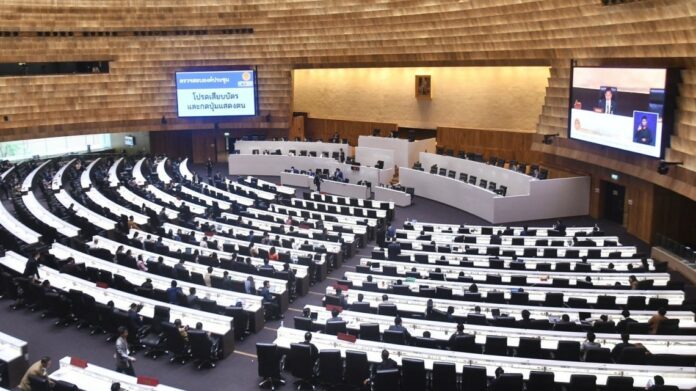
In a significant move, the Thai Cabinet has given the green light to amendments concerning the Alcoholic Beverages Control Law, as reported by national media on March 29th, 2024. The approval marks a pivotal step in reshaping regulations surrounding alcohol consumption in the country. These proposed revisions encompass a spectrum of changes, including the extension of selling hours and the introduction of greater flexibility in advertising regulations.
The introduction of these five bills for amendment signals a proactive approach by the government to address evolving dynamics within the alcohol industry. Among the proposed alterations, the extension of selling hours aims to accommodate shifting consumer behaviors and provide more opportunities for businesses in the sector to thrive. Likewise, the relaxation of advertising regulations seeks to adapt to the modern marketing landscape while ensuring compliance with regulatory frameworks.
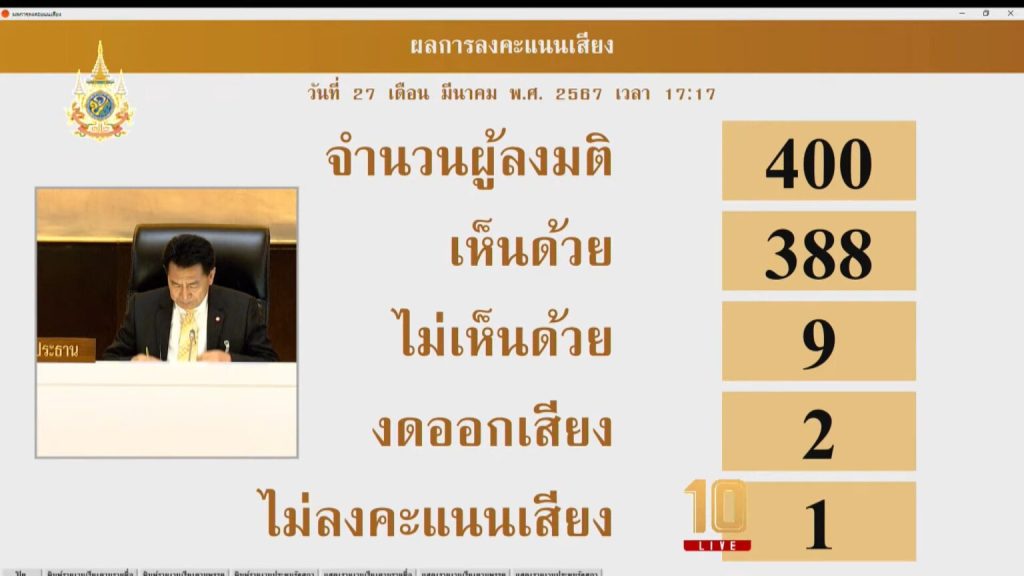
The momentum behind these amendments was evident during their initial reading in the council on March 27th. With an overwhelming vote of 389 to 9, and 2 abstentions, the bills garnered substantial support, reflecting a broad consensus on the need for regulatory reform. To ensure thorough scrutiny, a special parliamentary committee has been established to delve deeper into the proposed changes.
However, amidst the wave of enthusiasm for these amendments, dissenting voices have emerged. A coalition of advocacy groups dedicated to alcohol consumption control has voiced its reservations through an open letter addressed to House Speaker Mr. Wan Muhamad Noor Matha. Expressing concerns about the potential repercussions of extending selling hours and relaxing advertising regulations, the letter underscores the importance of cautious deliberation in policymaking.
Ms. Duangduean Inthanu, a prominent figure within the anti-alcohol advocacy network, has been vocal in her opposition to the proposed amendments. Emphasizing the absence of compelling justifications for altering existing legislation, she contends that the purported benefits aimed at stimulating the economy would predominantly favor alcohol-selling businesses.
As discussions surrounding the amendments continue to unfold, it is imperative for stakeholders to engage in constructive dialogue to address concerns and chart a course that balances economic interests with public health considerations. The forthcoming deliberations within the parliamentary committee will play a pivotal role in shaping the final outcome of these proposed changes to the Alcoholic Beverages Control Law.Mr. Santi Chomyong, serving as a spokesperson for an anti-alcohol advocacy group based in Ayutthaya, passionately appealed to the council to prioritize public welfare over commercial interests. His plea underscored the critical need for lawmakers to carefully weigh the potential negative impacts of heightened alcohol availability on the overall health and safety of the populace. This call for vigilance resonates within the ongoing discussions surrounding amendments to the Alcoholic Beverages Control Law, initiated by the Thai Cabinet.
In a contrasting stance, the Thai government has underscored the significance of fostering economic growth and bolstering tourism through a more permissive approach to alcohol regulations. However, amidst these ambitions, equal emphasis has been placed on the imperative of safeguarding public health and well-being. The delicate balance between economic interests and public health considerations remains at the forefront of deliberations concerning the proposed amendments.
As the bills undergo scrutiny within the parliamentary process, it becomes evident that the road to legislative fruition is marked by several checkpoints. While the initial reading in Parliament showcased considerable support for the proposed changes, subsequent stages, including committee meetings, serve as platforms for in-depth analysis and discourse. It is within these forums that stakeholders, including advocacy groups, government representatives, and experts, engage in constructive dialogue to refine and validate the proposed amendments.
TPN Media aptly notes that despite the progress made thus far, the journey toward enacting these amendments into law is far from over.
With several more readings in Parliament awaiting, and committee meetings yet to unfold, the legislative process remains dynamic and subject to further scrutiny and refinement. The trajectory of the proposed amendments to the Alcoholic Beverages Control Law underscores the nuanced interplay between regulatory frameworks, economic aspirations, and public health imperatives within the Thai context. As stakeholders continue to navigate this intricate landscape, the quest for a balanced and equitable regulatory framework persists, ensuring that the interests of all stakeholders are duly considered and safeguarded.
FAQs
What is the Alcoholic Beverages Control Law in Thailand?
The Alcoholic Beverages Control Law in Thailand is a set of regulations governing the production, sale, distribution, and consumption of alcoholic beverages within the country. It outlines various provisions related to licensing, advertising, age restrictions, and permissible alcohol content, among other factors.
Why is there a need for amendments to the Alcoholic Beverages Control Law?
Amendments to the Alcoholic Beverages Control Law may be proposed to address emerging issues, adapt to changing societal norms, promote economic growth, or enhance regulatory effectiveness. These amendments aim to ensure that the law remains relevant and responsive to evolving circumstances.
What are some of the proposed changes to the Alcoholic Beverages Control Law in Thailand?
Some proposed changes to the Alcoholic Beverages Control Law in Thailand may include extending selling hours, revising advertising regulations, updating licensing requirements, adjusting taxation policies, or introducing measures to promote responsible drinking and public health.
Related posts:
China Takes Top Spot for Thailand’s Tourist Arrivals
Police Arrest Two Pattaya Transgender Women for Stealing Indian Tourist’s Gold Necklace
Deputy Prime Minister Anutin Leads Massive Gambling Den Raid Operation in Nonthaburi, Over 300 Gambl...
Thai PM Srettha Thavisin Addresses Media Following Constitutional Court’s Petition Consideration
Politics
Thai PM Srettha Thavisin Addresses Media Following Constitutional Court’s Petition Consideration
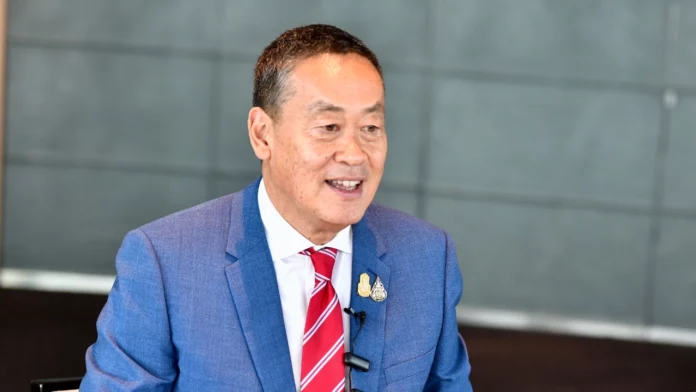
On May 23rd, 2024, at 4:30 PM (Japanese local time), Thai Prime Minister Srettha Thavisin, while on an official visit to Japan, spoke to the press about the Thai Constitutional Court’s consideration of a petition against him regarding the appointment of former Minister Pichit Chuenban.
Earlier that day, the Constitutional Court voted six to three to proceed with the petition against Srettha. However, by a narrow margin of five to four, the judges opted not to suspend him from his duties as Prime Minister during the investigation. The court granted him a 15-day period to respond to the complaint from the date he received a copy, as reported by Thai national media.
Srettha informed the media that he would consult with his legal team in response to the court’s order for an investigation. He underscored his responsibility as Prime Minister to govern the country and confront its challenges. While acknowledging that legal scrutiny is part of a political career, Srettha emphasized the importance of transparency and clarity in handling such matters.
“It is crucial to provide clarity to the public.”
Despite recognizing the difficulty in satisfying all political factions, Srettha appealed for trust in his leadership, emphasizing the well-being of Thai citizens as his foremost priority. He also expressed willingness to address any no-confidence motions in parliament, respecting the legislative process.
Srettha highlighted the roles of both the Legal Affairs and Executive Divisions in ensuring fair and thorough oversight. As part of the Administrative Division, he pledged to elucidate matters comprehensively and transparently to the public.
Related posts:
Thai Tourism Authority Seeks Increased Government Funding to Boost International and Domestic Flight...
China Takes Top Spot for Thailand’s Tourist Arrivals
Thai Political Activist Group Protests at Government House in Bangkok, Demands Justice for Activist’...
Thai Government Approves 272 Million Baht Project to Tackle PM 2.5 Dust and Wildfires in 17 Northern...
Politics
Thai Political Activist Group Protests at Government House in Bangkok, Demands Justice for Activist’s Death
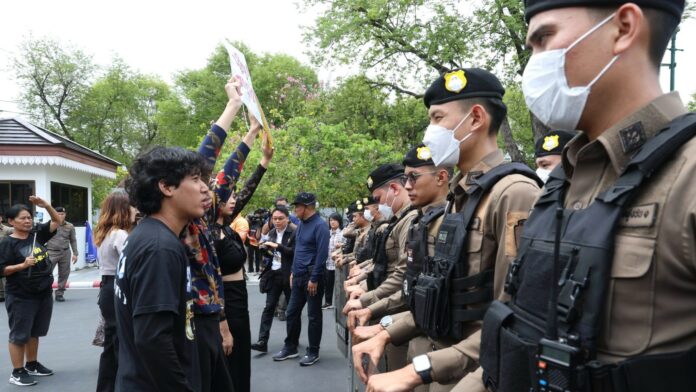
National News:
On May 21, 2024, at 11:30 AM, Thai national media reported that the Talufa Group held a protest at the Office of the Public Sector Development Commission (OPDC). They aimed to submit a letter to Mr. Somkid Chuekong, the deputy secretary-general of the Thai prime minister for political affairs, demanding justice in the investigation of Ms. Netiporn “Bung” Sanesangkhom’s death.
The activist group gathered at the OPDC to hear about the progress in Netiporn’s case. However, after an hour of protest, no official responsible for the case appeared to receive the letter.
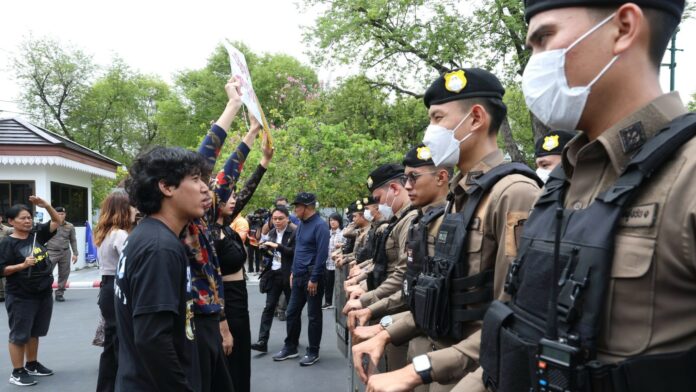
The group then moved to the Government House, where police officers prevented them from entering due to an ongoing cabinet meeting.
The Talufa Group publicly stated that the Pheu Thai Party had previously committed to considering amendments to Section 112 (Lèse Majesté) and granting amnesty to political prisoners under the same section. Despite the Pheu Thai Party being in power for ten months, there had been no response from the party, according to Thai national media.
After protesting in front of the Government House, the activists returned to the OPDC and successfully submitted the letter to Somkid.
Previously, a lawyer from the Thai Lawyers for Human Rights representing Netiporn had questioned the Thai Corrections Department regarding the cause of her death. However, the report was still pending, leaving the circumstances of Netiporn’s death in doubt, noted Kritsadang, the lawyer from Thai Lawyers for Human Rights.
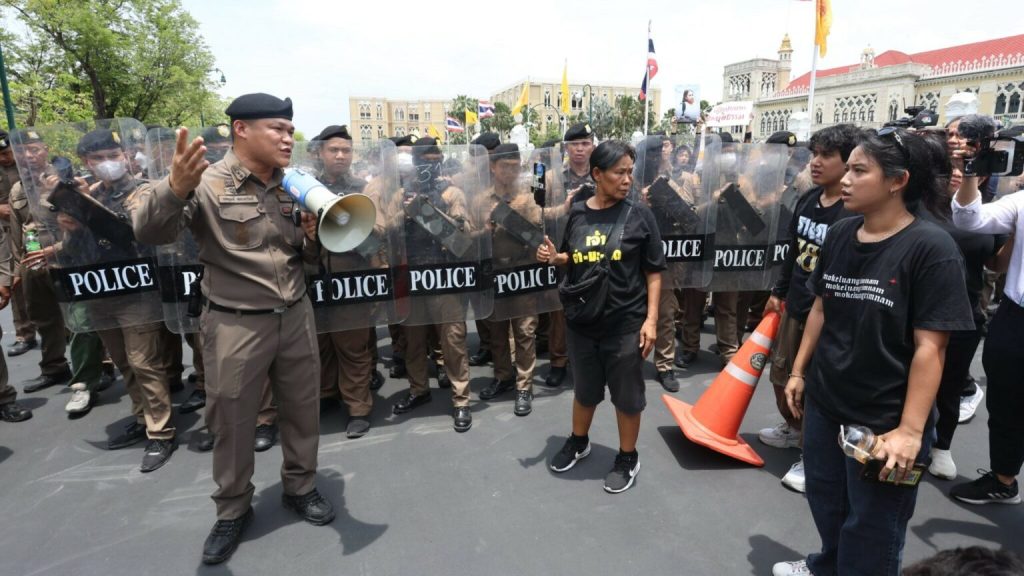
Related posts:
Deputy Prime Minister Anutin Charnvirakul Addresses Alleged Foreign Mafia in Phuket, Vows to Take Se...
Thai Defense Minister and Relevant Agencies Visit China for Submarine Procurement Discussion
Thai Government Approves 272 Million Baht Project to Tackle PM 2.5 Dust and Wildfires in 17 Northern...
Thai Tourism Authority Seeks Increased Government Funding to Boost International and Domestic Flight...
Politics
Thai Tourism Authority Seeks Increased Government Funding to Boost International and Domestic Flight Promotions

National—
On May 21st, 2024, Mr. Siripakorn Cheawsamoot, the Deputy Governor for International Marketing in Europe, Africa, the Middle East, and the Americas, requested financial support from the Thai government to bolster tourism markets through mutually beneficial alliances.
Despite the Tourism Authority of Thailand (TAT) receiving only a small portion of government funding, the TAT collaborated with various partners to promote remote marketing, particularly with international and domestic airlines, Siripakorn stated.
The TAT supported flights to both primary and secondary cities in Thailand. However, Siripakorn emphasized that the Thai government should increase financial support to enable more promotional activities with airline partners.
As Thailand approaches its high season in winter, there is an expected gradual recovery of airlines, with new airlines reportedly being approved to operate.
Furthermore, the TAT is exploring ways to assist airline operators in accessing Thailand’s aviation hubs via inter-indicators, Siripakorn added.
From April 2nd to 5th, 2024, over 20 airline representatives, in cooperation with public and private sectors, recognized the potential of Thailand’s aviation market and new routes during a meeting. Siripakorn reported that, with the high season approaching, four airlines are interested in launching new routes, offering a total of 200,000 seats by the end of the year.
Expanding flights to Thailand aligns with the Thai government’s strategy to enhance connections between Thai airports and international airports such as Istanbul-Bangkok and United Arab Emirates-Bangkok, along with charter flights. Additionally, new routes are now available from Middle Eastern airlines, Air Arabia, Air Canada, and others, Siripakorn noted.
Siripakorn also mentioned that in 2024, the TAT aims to generate tourism revenues totaling three trillion baht from both foreign and Thai tourists. However, Thai Prime Minister Srettha Thavisin has set a higher goal of 3.5 trillion baht.
“It is possible to generate over 3.5 trillion baht if the government approves financial support for the TAT,” asserted Siripakorn.
Related posts:
Thai Defense Minister and Relevant Agencies Visit China for Submarine Procurement Discussion
Thai Government Approves 272 Million Baht Project to Tackle PM 2.5 Dust and Wildfires in 17 Northern...
Deputy Prime Minister Anutin Leads Massive Gambling Den Raid Operation in Nonthaburi, Over 300 Gambl...
Thai Minister Pichit Chuenban Resigns in Attempt to End Political Drama
-
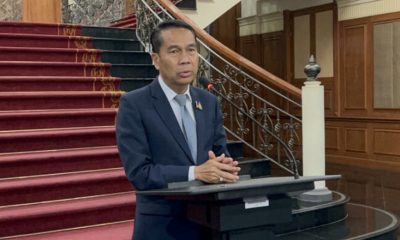
 Politics2 years ago
Politics2 years agoThai Defense Minister and Relevant Agencies Visit China for Submarine Procurement Discussion
-

 Entertainment2 years ago
Entertainment2 years agoPattaya Music Festival 2024 Begins This Friday
-
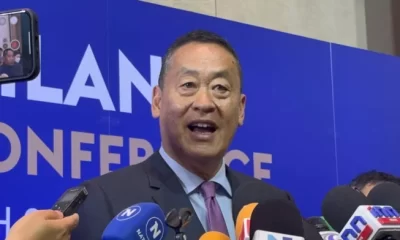
 Entertainment2 years ago
Entertainment2 years agoThai Parliament Votes to Deliberate Further on Opening Entertainment Complexes With Legal Casinos
-

 Entertainment2 years ago
Entertainment2 years agoPattaya Mayor Eyes Opportunity in Casino-Entertainment Complex Project, Jomtien Suggested as Prime Location
-

 Politics1 year ago
Politics1 year agoThai Tourism Authority Seeks Increased Government Funding to Boost International and Domestic Flight Promotions
-

 Entertainment1 year ago
Entertainment1 year agoPattaya Sky Ride Grand Opens Offering Amazing and Thrilling Helicopter Tours
-

 Entertainment1 year ago
Entertainment1 year agoThailand’s Maya Bay Ranks 5th Among World’s Best Beaches, Pattaya Beach Ranks 12th
-
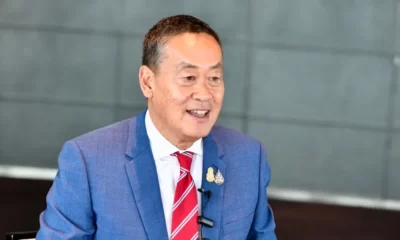
 Politics1 year ago
Politics1 year agoThai PM Srettha Thavisin Addresses Media Following Constitutional Court’s Petition Consideration




